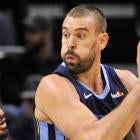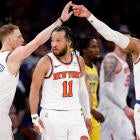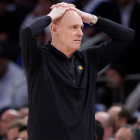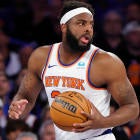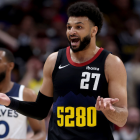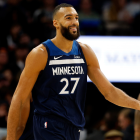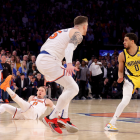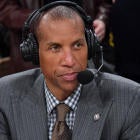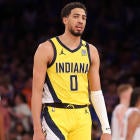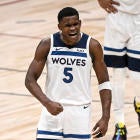Coaches love to say that the NBA is a copycat league. One team learns to exploit certain inefficiencies, or innovate with new schemes, and suddenly the rest of the league tries to catch up and does the exact same thing.
The most obvious examples of copycatting in today's NBA have to do with increased pace and increased three-point shooting. Everyone seems to be running and gunning in today's NBA. In 2011-12, NBA teams averaged 91.3 possessions per 48 minutes. That has increased every season since then, topping at 100.3 possessions per 48 minutes this season. If that keeps up, this will mark the first season in 30 years when NBA teams averaged more than 100 possessions per 48 minutes. As for three-point shooting, the Houston Rockets were a three-point shooting outlier as recently as the 2016-17 season, when they attempted 40.1 threes per game. Only five other teams averaged more than 30 threes per game that season. This season, 18 NBA teams are averaging 30 or more three-point attempts per game. The Rockets set an NBA record in the 2014-15 season when they attempted 31.8 threes per game. Four seasons later, that's roughly what the average NBA team shoots.
But one thing that any economist will tell you is that there is value in exploiting market inefficiencies. When everyone else is doing one thing, you can find an advantage by doing another thing altogether. When other teams zig, you can zag.
And there's no team doing a better version of zagging during the 2018-19 NBA season than the Memphis Grizzlies.
As NBA teams increase their pace to previously unheard of levels, as the NBA's emphasis on freedom of movement rules this season has given even more of an advantage to offensive production, the Grizzlies have done the opposite. They've doubled down on the Grit 'n Grind defensive mentality; the Grizzlies now rank fourth in defensive efficiency after dipping all the way down to 26th during last season's tankathon. And they're taking the modern NBA's full-court game and slowing it down into a half-court game, sporting the slowest pace in the NBA at 95.3 possessions per 48 minutes.
"It was a conscious decision that we made to play this style of basketball," Grizzlies head coach J.B. Bickerstaff replied when I asked him why the Grizzlies are so much more stout on defense than a season ago. "We keep looking around the league and everybody's playing the same way. Everybody wants to run. Everybody wants to shoot threes.
"So as a coaching staff we sat down and tried to figure out a way where we could be unique," he continued. "And understanding the makeup of our team, our personnel strengths – we're very comfortable playing in the half-court. Some teams, they struggle when the game is slowed down because they are so used to playing at a certain pace. And every night, you prepare for a team, they're all playing fast, they're all playing the same way. And then when you come play us, it's like you come to a screeching halt. We want to see how we can impact teams. During the season there's not a ton of time for practice. So you don't get an opportunity to work on it as much. You get accustomed to playing one way. We wanted to see if we could be unique enough to make people uncomfortable when they play us."
In the first quarter of the Grizzlies 100-87 road win over the Minnesota Timberwolves over the weekend, the renaissance of Grit 'n Grind was on full display.
A minute and a half into the game, Karl-Anthony Towns had the ball along the wing with former NBA Defensive Player of the Year Marc Gasol guarding him. Towns pump-faked then drove across the court and lifted up for a hook shot. Gasol blocked it. A minute later, Gasol thieved the ball off of Taj Gibson. On the Grizzlies next defensive possession, Kyle Anderson swiped the ball away from Andrew Wiggins as Wiggins pushed the ball in transition. Jeff Teague drove into the post and swooped under and around Gasol before he attempted to swing a pass to Wiggins in the corner; Anderson was standing right there and stole the pass, almost as if the play had been run for him. Moments later, on their next defensive possession, Anderson pressured Wiggins as he brought the ball up and then forced another turnover at mid-court. A bit more than five minutes into the game, Teague drove toward the baseline and then attempted a bounce pass to Wiggins. But the pass hit the end line. Another turnover. Wolves' coach Tom Thibodeau was fed up – five turnovers in five minutes will do that – and called a timeout.
By the end of the slow-paced, low-scoring first quarter, the Wolves were clearly frustrated. The Grizzlies had blocked four shots and stolen the ball five times in the first quarter. Even though the Wolves were up three, it felt clear that the Grizzlies were forcing the Wolves into playing Grit 'n Grind basketball. At the end of the quarter, Towns walked to the bench, visibly frustrated and jawing with the referee. The ref looked close to giving Towns a technical foul after he said something that crossed a line. "Not like that!" the ref lectured Towns.
And the Wolves still had 36 more minutes of Grizzlies defense to endure.
"We always had that mentality and but we probably didn't show it with our way of playing (last year)," JaMychal Green, who is in his fifth season in Memphis, told me. "For the fans, it's time to see us getting back to our old ways. Everybody's flying around, making the extra plays defensively. We're all trying to help each other out. Everybody has a good IQ of the game. Everybody has a great feel for defense. Defense is just a 'want to,' and everybody wants to."
This mentality plays well in Memphis. Memphis is a gritty, hard-working town, and the Grizzlies' defense-first mentality has always been a perfect reflection of the city. Can that style win you a championship? Perhaps not. But it certainly can win you a ton of regular-season games. Before last season, where Mike Conley's injury derailed things from the beginning, the Grizzlies had made the playoffs seven seasons in a row. That may be seen as not enough in New York or Los Angeles. In Memphis, that's competing, and that's being relevant, and there's something to that. You don't have to go any further than the city where the Grizzlies won on Sunday – Minneapolis, which last season broke the longest playoff drought in the NBA – to remember that making the playoffs is not something to be taken lightly.
So what's different about this team compared to a year ago, when the defense – and the team – was awful? One is health. Two is that the Grizzlies roster has an incredibly high defensive IQ; as Gasol told me, while other teams may struggle to defend this season as the NBA is cracking down on physical play, the Grizzlies' defensive style is based on positioning and anticipation instead of athleticism and using their hands. Three is that Bickerstaff is no longer an interim coach like he was last season after David Fizdale and the Grizzlies parted ways. When a coaching staff is permanent, Bickerstaff said, "You get to put a plan in place. It's not a 'What the hell are we going to do today?' plan. It's a two- or three-year plan. You can live with making decisions on the big picture instead of making decisions on tonight's game, tomorrow's practice. You can stick to your guns a little bit in your principles because you know you're trying to build something bigger."
But if you ask Marc Gasol, who seemed so frustrated with last year's tanking, the answer for the Memphis defensive renaissance is pretty simple.
"We're trying to win!" Gasol laughed when I asked. "The main goal is we're trying to win. I think last year that wasn't per se the main goal. This year there's no second-guessing. The only goal is to win. And the best way to give us a chance to win is to play that type of defense. There's no other way for us. We don't have the firepower to go for 130 points a night."
And here's one final reason why the Grizzlies are, at 11-5 and are currently competing for a spot at the top of the Western Conference, one of the most surprising teams in the NBA so far. It's Gasol. Any idea that Gasol was on the downhill slope of his career last season has been dispelled so far this season. His defensive statistics may not be eye-popping – he's averaging 1.5 blocks and .9 steals per game – but the 33-year-old is the fulcrum of one of the NBA's best defenses, and one of the NBA's most surprising teams.
"He's extremely smart," Bickerstaff said. "That allows him to be in places early, and when you're there early, you're never guessing, you're never late. His anticipation, the way he studies the game, he knows the plays they're getting ready to run as soon as they're called. He's the Defensive Player of the Year, and this year, so far, I don't see anyone who's been better than him defensively."













